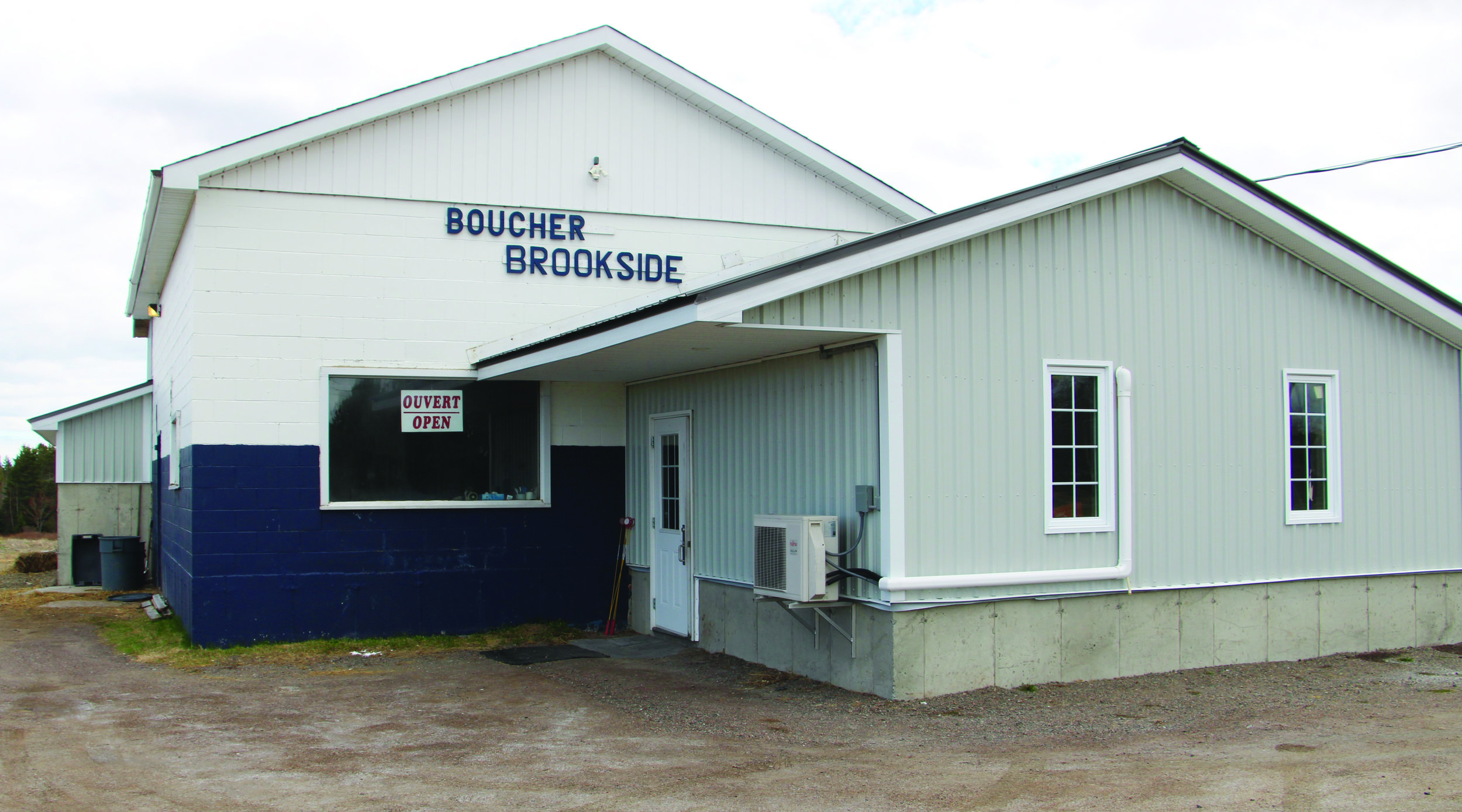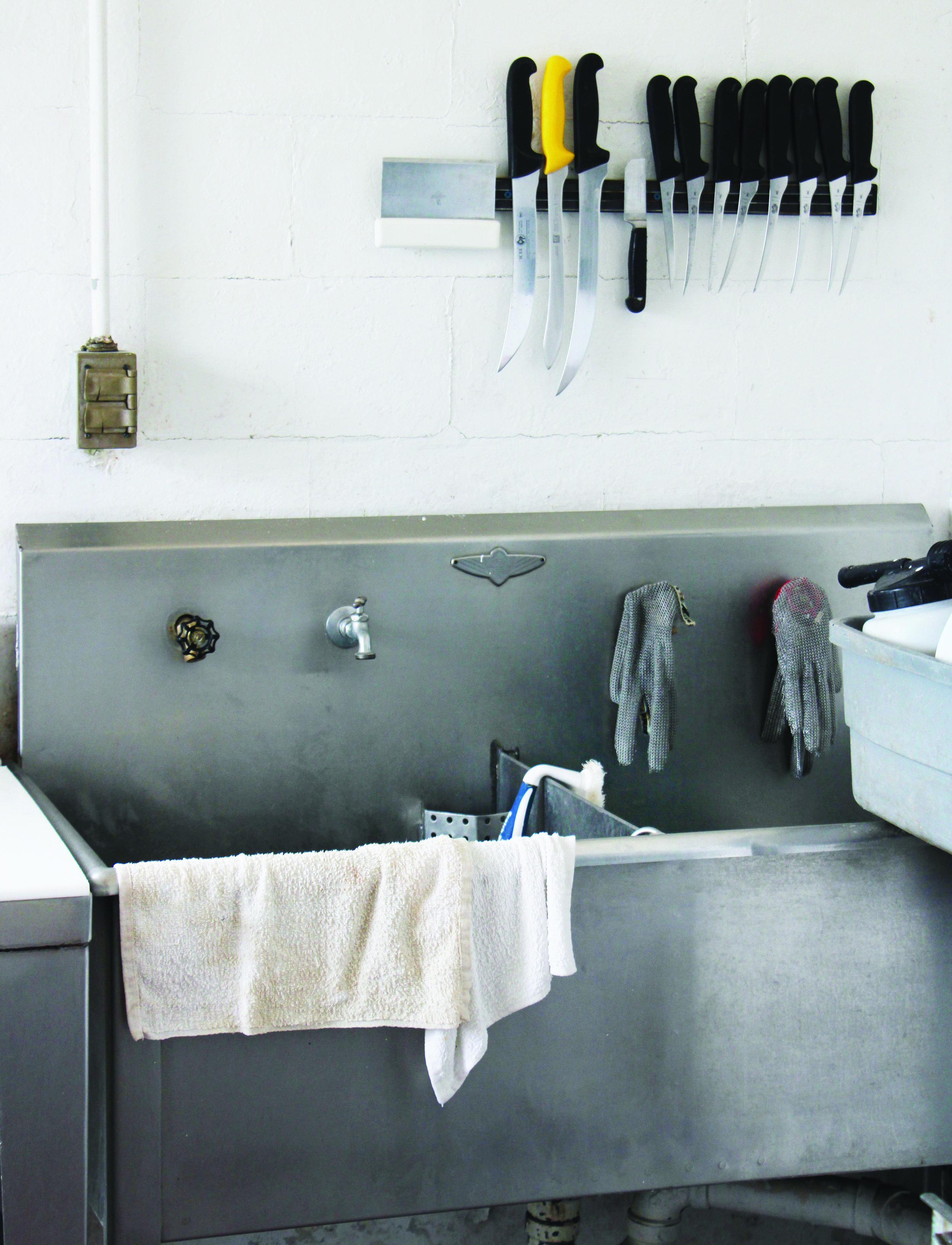Young N.B. farm couple are a cut above the rest
/by George Fullerton
Carolyn Wilson and Mark Folkins received the Agricultural Alliance of New Brunswick’s new entrant award at the organization’s annual general meeting in January.
Both come from established farm families, and met through mutual friends who had attended Dalhousie University’s Agricultural Campus. Wilson graduated with a master’s of science degree in agriculture from Dal AC in 2017, and Folkins has a business management diploma specializing in dairy farming from Dal AC.
Folkins’s family – his parents Thelma and Cecil, along with his brother Jake and his wife Ellen – operate a dairy farm in Mount Middleton, outside Sussex. Wilson’s family – her parents Mark and Lisa, along with her brother Isaac – raise beef, sheep, poultry, and grain in Sainte-Marie-de-Kent, and operate West Branch Feeds, which sells non-GMO livestock feed.
A couple of years ago, Wilson and Folkins became aware of a butcher shop in Sainte-Marie-de-Kent whose owner was approaching retirement age.
“We visited Rheal Boucher at his shop and asked if the business might become for sale,” said Carolyn. “As it turned out, it was for sale, but with a specific condition. Rheal wanted a full-time job in the shop until he officially retired.”
The couple bought the property in 2017. The Brookside Butcher is the name of their shop.
Since Folkins was to become the manager of the kill and meat shop, and had virtually no experience in the business, having an experienced mentor on staff was a bonus.
Boucher built the shop in 1991, initially as a means to add value to beef from his own farm. However, the business grew to a point where he had no time to farm, and he switched to buying slaughter animals from farmers in the local region. He also bought certain meat products, such as bacon, from commercial suppliers to offer to his customers.
“Rheal is close to 65 but he still wanted to work and draw salary, but with less business management responsibility and stress,” said Folkins. “Rheal talks about retirement, but he puts in more than an honest day’s work in the shop. But he is talking about taking a few days off to make some trips.
“Under Rheal’s management, the carcasses were cut to make specific orders for individual customers who came in through the front door. At one time, he also made door-to-door deliveries from a refrigerated truck, which he claimed never made a cent, but made a whole lot of customers who eventually made a habit of dropping in the shop.
HELP FROM FRIENDS
“Rheal has taught me so much about the business and the cutting trade and about the customers,” said Folkins who came green to the meat shop business. “I also am good friends with Bryce Anderson, who owns The Country Butcher shop in Sussex, and I often call him to ask questions about business or equipment. I have also become friends with Paul Cormier who owns a meat shop in Saint Antoine, and he too is very forthcoming with information and advice. They have both been very helpful and supportive.”
Folkins and Wilson have stayed with the concept of cutting to fit individual customers’ requests, but have also added a number of new products and value-added processing, as well as making notable upgrades to the physical plant.
“Rheal had questions when we began introducing some of our ideas into the business, but he soon became an enthusiastic supporter after he saw the new products catch on with old and new customers,” said Folkins.
The decision to operate a smoker was one such change.
Boucher would buy in sides of bacon from distributors in Quebec to have on offer for his customers. When the smoker was introduced, he had questions about how it would work.
“Once we had the smoker operational and offering on-site smoked bacon, the customers embraced it,” said Folkins. “The smoker generates a pleasing aroma and it helps sell the bacon and other smoked products. In fact, the smoker generated so much business, we began to be concerned about moving other cuts from the hog carcasses. Pork chops always sell well, but some other cuts not so well. In order to utilize those other cuts, we decided to make sausage, and they have become very popular with our customers.”
Wilson works as a math and English teacher at Bonar Law Memorial High School in Rexton, and she handles the business matters, farmers’ market sales, and social media (including the Brookside Butcher Facebook page), as well as helping out with farming chores.
“The Bouctouche Farmers’ Market operates May through to the end of October, and we have a lot of products on offer,” said Wilson. “The market introduces us to a different clientele – a lot of tourists and people staying at their cottages. We have made a lot of new customers there. The market management had a request for hot dogs, so we have been experimenting with recipes and smoking them, and now we are sourcing the buns. We will cook them on site and customers can eat them as they enjoy the market.”
WELCOME ADDITIONS
The couple has made additions to both ends of the meat shop building. An addition at the back, completed in 2018, includes a number of individual pens made of plywood-covered steel gates set at an angle to the alley leading to the kill floor.
“Most farmers who supply locally have other jobs and like to deliver Sunday evening for the Monday kill day, so there is lots of convenient, comfortable, and safe space for the livestock,” said Folkins.
A processing room – housing a smoker, dehydrator (for jerky), and vacuum packaging equipment – was completed in 2017.
“We worked very closely with the (provincial and federal) inspectors who inspect our operation on a regular basis,” said Folkins. “They provided guidance to ensure the construction and the equipment and the layout would exceed requirements. It was a lot of work and expense, but we are very happy with the way it worked out and the benefits it brought to our business.”
While a part of the livestock supply is from other local farms, the primary supply comes from the Folkins and Wilson home farms.
Early in 2019, the couple attended the Annual Meat Conference in Dallas.
“It was a very valuable trade show,” said Wilson. “We met a lot of people who operated smaller shops and were great to share production and business ideas and also recipes.”
The couple put a lot of energy into the meat shop, but they’re also developing their own farmland and making plans to build barns to house more of their own livestock to market through the shop.
“Last year, we plowed up 40-year-old sod and planted buckwheat – initially to become a green manure – but had enough crop to be combined and sold to a dealer,” said Folkins. “We also grew an acre of pumpkins, which sold from the front yard of the shop to customers who were buying meat.”
Wilson also hatches eggs from her own flock of laying and dual-purpose hens, with the eggs marketed through the shop and the farmers’ market. And last summer, the couple raised pastured turkeys, which were killed and processed at Wilson’s parents’ small poultry processing plant.
Wilson and Folkins have plans to wed this summer. However, their nuptials will have to be jammed into a very busy summer farming and sales schedule, and the honeymoon will most likely be pretty close to home.










